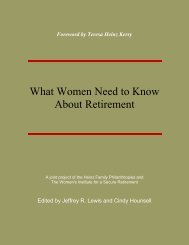What Women Need to Know About Retirement - Wiser
What Women Need to Know About Retirement - Wiser
What Women Need to Know About Retirement - Wiser
Create successful ePaper yourself
Turn your PDF publications into a flip-book with our unique Google optimized e-Paper software.
countries that have yet <strong>to</strong> develop their economies <strong>to</strong> the extent of areas like the United States,<br />
Japan or Western Europe. Specialized sec<strong>to</strong>r funds focus on a particular industry, like<br />
technology or health care. Every s<strong>to</strong>ck fund has its own investment approach and its own<br />
balance of risk <strong>to</strong> potential returns.<br />
However, the main distinction you need <strong>to</strong> know is between actively-managed funds and their<br />
passively-managed (or index) counterparts. As their name implies, actively managed funds are<br />
run by people who take an active hand in managing their investments. These managers are<br />
constantly making decisions about which s<strong>to</strong>cks <strong>to</strong> buy, which ones <strong>to</strong> sell and which ones <strong>to</strong><br />
hang on<strong>to</strong>. When you invest your money in one of these funds, you’re really betting on the<br />
managers’ ability <strong>to</strong> buy the right s<strong>to</strong>cks.<br />
Index funds are considered “passive” because their managers simply buy the s<strong>to</strong>cks that make up<br />
a specific market index, like the S&P 500. They don’t make any active decisions on which<br />
s<strong>to</strong>cks <strong>to</strong> own, and so they don’t have the costs of actively-managed funds for things like<br />
research or high-powered investment advice. This translates in<strong>to</strong> savings for you in terms of<br />
lower overall fees over the long run.<br />
Even the best active manager can have a bad year, and there’s no guarantee that you’ll be able <strong>to</strong><br />
pick the best manager. Over the long haul, research shows that you would generally be better off<br />
investing in index funds that follow the s<strong>to</strong>ck market as a whole.<br />
The Big Secret of S<strong>to</strong>ck Investing: Fees Matter<br />
Now that you know the s<strong>to</strong>ck basics, you’re ready for perhaps the most important information in<br />
this chapter: fees matter.<br />
There’s nothing magical about index funds. If the index they track goes up, the fund goes up<br />
with it, and you make money. If the index goes down, the fund goes down, and you lose money.<br />
Actively-managed funds tend <strong>to</strong> be a lot more expensive than index funds, and these added costs<br />
take a bite out of the money that these funds can make for you.<br />
Every mutual fund company charges its inves<strong>to</strong>rs an annual fee in order <strong>to</strong> cover its costs, pay its<br />
managers and other employees, and make a profit. This fee, called the expense ratio, varies<br />
widely from fund <strong>to</strong> fund, but is always a percentage of the money you have in a particular fund.<br />
For example, if you have $1,000 invested in a fund that carries an expense ratio of 1.83 percent,<br />
the fund company will au<strong>to</strong>matically deduct $18.30 from your account.<br />
In late 2006, the average actively-managed s<strong>to</strong>ck mutual fund carried an expense ratio of 1.49<br />
percent, or $14.90 on every $1,000 you invest. On the other hand, you can find index funds that<br />
charge as little as 0.07 percent, or 70 cents on every $1,000. While performance will vary from<br />
fund <strong>to</strong> fund and from year <strong>to</strong> year, this fee gap means that, everything else being equal, your<br />
actively-managed fund has <strong>to</strong> beat the index fund by an extra 1.42 percent every year just <strong>to</strong><br />
break even. Over the long haul, there aren’t <strong>to</strong>o many active managers who can do that.<br />
If you invested $1,000 in an index fund and your friend invested the same amount in an activelymanaged<br />
fund—both returning the same eight percent per year—after 10 years, you’d have $266<br />
more than your friend because the average managed fund costs so much more than the index<br />
fund. Go back <strong>to</strong> 20 years ago, and you’d be ahead by $1,071 <strong>to</strong>day.<br />
24




